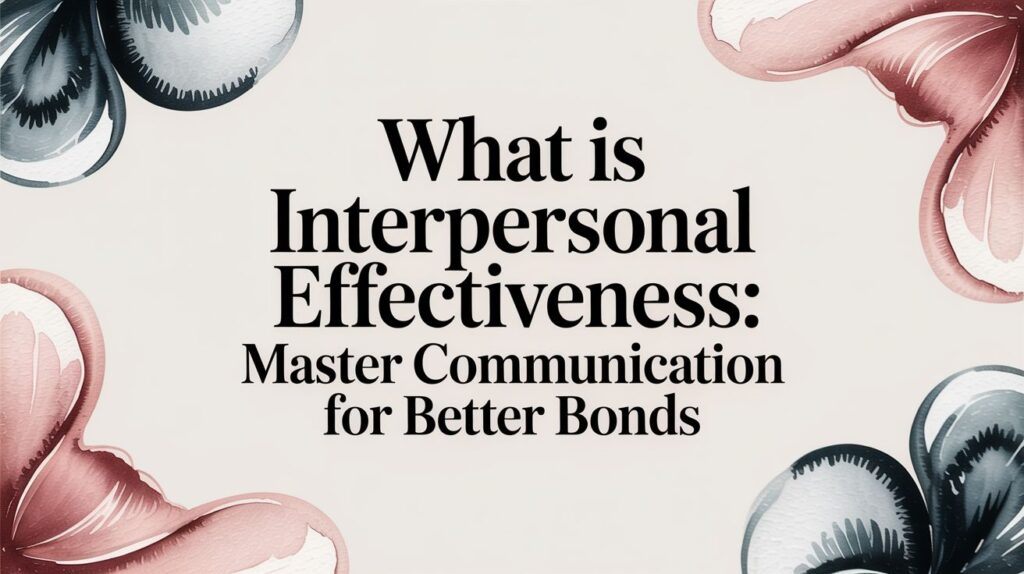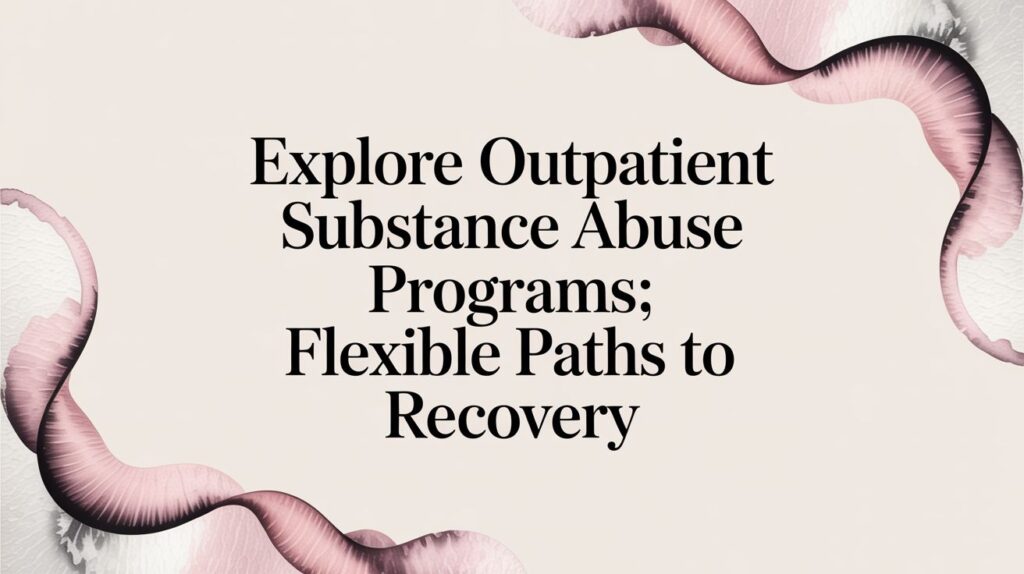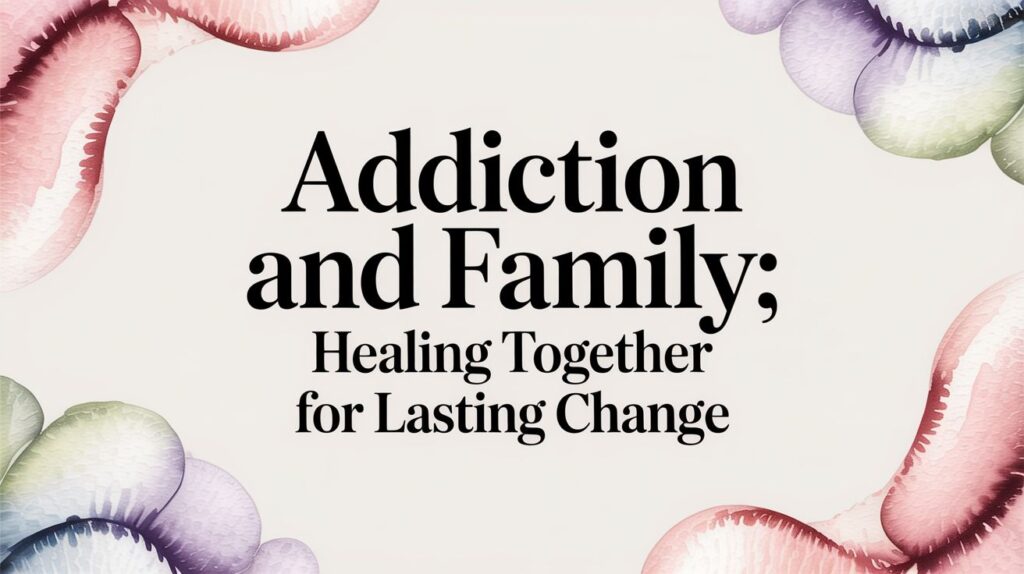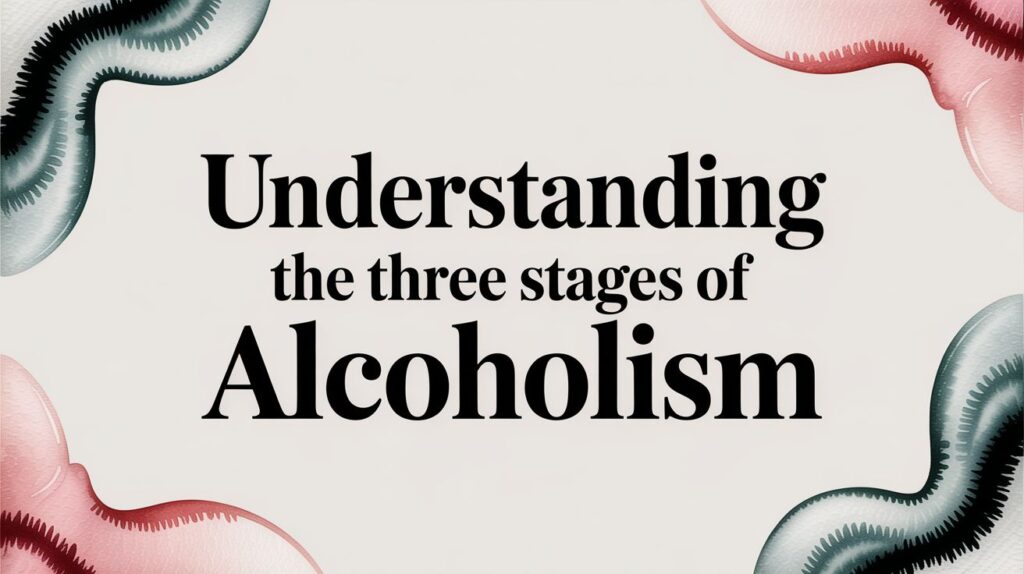Motivational Interviewing isn't about a therapist telling you what to do. It’s a collaborative counseling style designed to help you find your own reasons to change and build the commitment to see it through. Instead of pushing an agenda, it’s a partnership focused on exploring and resolving the uncertainty that keeps you stuck.
What Is Motivational Interviewing in Simple Terms?
Imagine you’re trying to convince a friend to start working out. If you just say, “You need to go to the gym,” their defenses probably go right up. Nobody likes being told what to do, and that direct approach often triggers an impulse to push back.
Motivational Interviewing (MI) takes the opposite track.
Think of it less like a drill sergeant barking orders and more like a supportive travel guide. A guide doesn't drag you up the mountain. They walk alongside you, pointing out different paths, talking about your goals, and helping you see that you already have the strength for the journey. In the same way, MI is all about helping you find your own "why" for making a change.
A Partnership Built on Empowerment
This whole conversation is built on a foundation of mutual trust and respect. It starts from the belief that you are the expert on your own life. The therapist isn't there to lecture or hand you a pre-made solution. Their job is to listen—really listen—and help you voice the internal conflict you feel about changing.
For instance, someone might know smoking is bad for their health but also rely on it to manage stress. MI creates a judgment-free space to explore both sides of that coin.
This process helps you:
- Uncover your core personal values and goals.
- See the gap between your current actions and the person you want to be.
- Build genuine confidence in your ability to make a change.
- Create your own realistic plan for moving forward.
At its core, motivational interviewing is about evoking from you your own good reasons to change. It honors your autonomy, recognizing that lasting change is most powerful when it comes from within, not from external pressure.
This approach is incredibly effective in all sorts of settings, from formal therapy to quick chats with a doctor. It’s a key piece of many evidence-based addiction treatment programs, often used to help people get ready for the structured work of figuring out what rehab is and committing to the process. By tapping into your own motivation, MI builds a powerful foundation for real, sustainable change.
The Origins of This Collaborative Approach
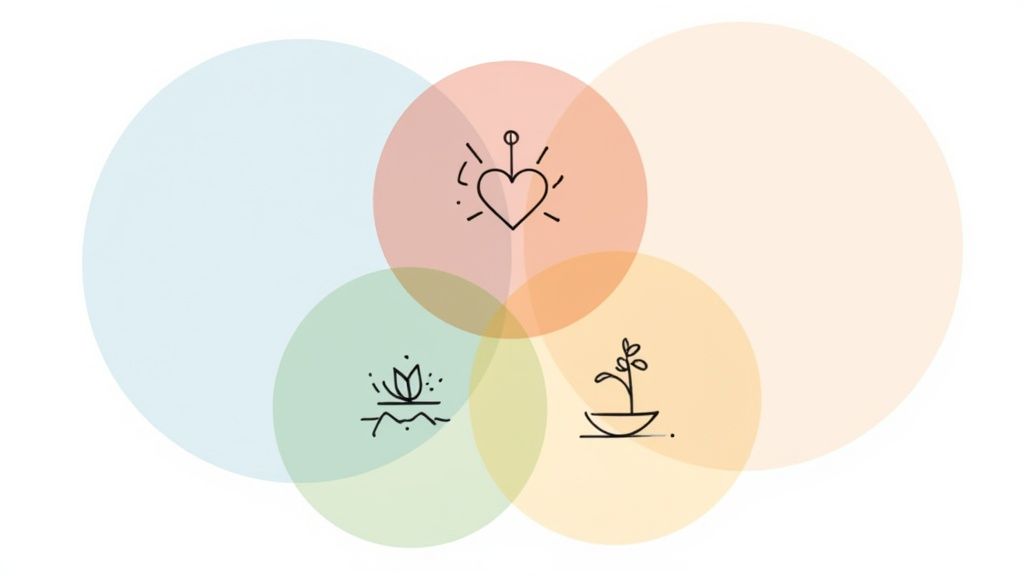
To really get what motivational interviewing is all about, you have to look at where it came from. This approach wasn’t just dreamt up in a lab; it grew out of a real-world need for something better—a more humane and effective way to help people who were stuck.
The story starts back in the world of addiction treatment. For a long time, the prevailing wisdom was to confront, challenge, and break down a person's denial. It often didn't work. In fact, it usually just made people dig their heels in even deeper.
Clinical psychologists William R. Miller and Stephen Rollnick saw this firsthand. They began piecing together the core ideas in the 1970s, and first laid out the formal approach in a 1983 publication. It was a radical departure, built not on confrontation but on collaboration. You can trace its full timeline in this detailed paper on the evolution of motivational interviewing.
From Niche Technique to Global Standard
What started as a specialized tool for alcohol counseling didn't stay niche for long. Other clinicians and researchers quickly saw that its core principles—partnership, acceptance, and compassion—weren’t just for addiction. They were universal.
This new model offered a powerful alternative to the old "expert knows best" dynamic that so often backfired. Instead of telling people what to do, it helped them find their own reasons to change.
Over the next few decades, the evidence started piling up.
- Early 1990s: The very first treatment manual was published, which opened the doors for practitioners everywhere to learn and apply the techniques.
- The 2000s: A wave of clinical trials cemented its reputation, showing it worked for everything from improving healthcare adherence to managing chronic mental health conditions.
- Present Day: It's now a foundational skill taught in medical schools, social work programs, and counseling graduate schools across the globe.
This history matters because it shows that Motivational Interviewing isn't some fly-by-night therapy trend. It’s a carefully honed, deeply researched method with a proven track record of helping people make lasting changes.
The strength of motivational interviewing lies in its deep respect for an individual's autonomy. Its journey from a specific addiction tool to a global communication standard proves that empowering people to find their own reasons for change is a fundamentally effective approach.
That solid, evidence-based foundation is precisely why it has become a cornerstone of modern therapy.
Understanding the Four Principles of MI
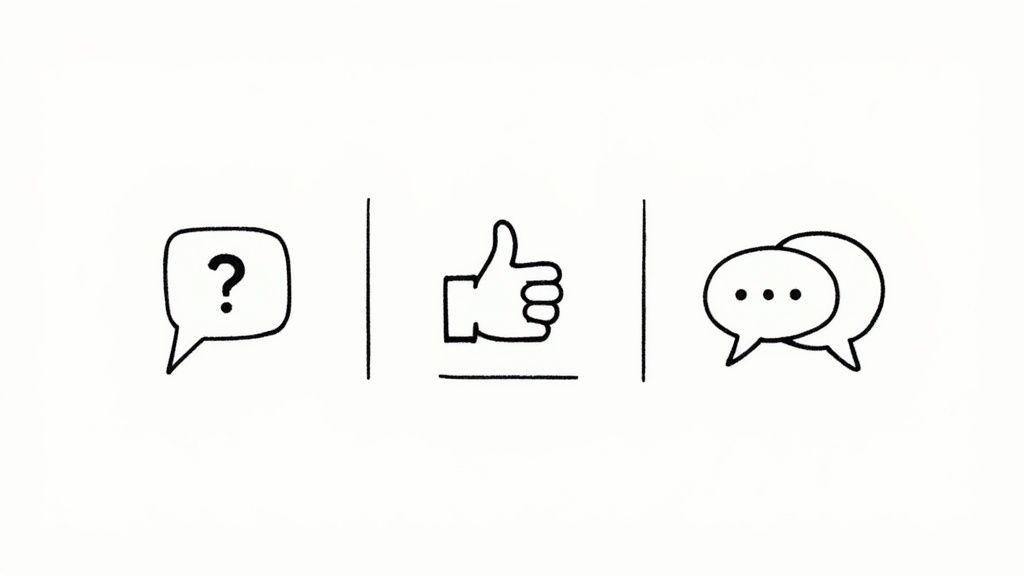
The entire MI approach is built on four core principles. Think of them not as rigid instructions, but as the "spirit" of the conversation—a mindset that guides every interaction and keeps the dialogue collaborative and focused on the client.
To make them easy to remember, these principles form the acronym RULE. Each one flows naturally into the next, creating a powerful foundation for exploring change. Let's unpack what they look like in practice.
Resist the Righting Reflex
It's a deeply human instinct. When we see a problem, we want to fix it. This urge, known as the "righting reflex," is often the first reaction for anyone in a helping profession. We want to give advice, offer solutions, and steer someone toward the "right" choice because we genuinely want to help.
In MI, however, this reflex is the single biggest roadblock. Imagine you're leaning against a stuck door. The harder you push, the more the person on the other side pushes back. It's the same in a therapy session. When a therapist tries to force change, the client instinctively digs in their heels and defends their current behavior.
Instead of pushing, MI practitioners learn to step back. They consciously resist the urge to correct, argue, or persuade. This simple act of not forcing the issue creates the space needed for a real conversation, allowing the client to explore their own feelings without getting defensive.
Understand the Client's Motivations
The second principle is a total shift in focus: it's not about the therapist's goals, but the client's. Lasting change doesn't happen because someone else thinks it's a good idea. It happens when a person uncovers their own reasons to do things differently. This principle is all about genuine, deep curiosity.
A therapist's job isn't to install motivation; it's to help the client find the motivation that's already there. This means asking questions that go to the heart of what matters to them:
- What's most important to you in your life?
- Where does this behavior fit in with your core values?
- What are your biggest hopes for your future?
By exploring the world through the client’s eyes, the therapist helps them connect their own personal goals—like being a more present parent or feeling healthy enough to travel—to the idea of making a change.
“The core of motivational interviewing isn’t about talking a person into changing; it’s about helping them talk themselves into it by uncovering the motivations that are already there.”
This deep level of understanding forges a strong therapeutic alliance. It proves to the client that they are being heard and respected as the true expert on their own life, which is the bedrock of MI.
Listen with Empathy
This goes so much deeper than just hearing words. It requires active, reflective listening, where the therapist works to grasp the unspoken meaning and feeling behind what the client shares. They essentially act as a mirror, reflecting the client’s thoughts back to them in a way that says, "I really get it."
This isn’t about agreeing or disagreeing with the client. It’s about communicating a profound, non-judgmental acceptance of their experience, messy as it may be. When someone feels truly understood, they feel safe enough to open up and explore their own mixed feelings honestly. This empathetic connection is the engine that drives the entire MI process.
Empower the Client
Finally, MI is grounded in the belief that every client is capable of making their own decisions and creating their own solutions. The therapist acts as a supportive partner, focusing on building the client’s self-efficacy—their belief in their own ability to succeed.
This is done by shining a light on their past successes, no matter how small. The therapist affirms the client's strengths and openly expresses confidence in their potential to change. Empowerment means placing the responsibility and the power for change squarely in the client's hands, reinforcing that they are in the driver's seat. This fosters the sense of hope and personal agency that are absolutely critical for making change stick.
How a Motivational Interviewing Session Works
A motivational interviewing session isn't a rigid, one-size-fits-all script. It’s much more organic than that. Think of it as a natural, guided conversation that unfolds across four overlapping phases, moving you gently from connection to commitment.
It’s a bit like building a house. You can't start putting up walls before you've poured a solid foundation. MI follows a similar logic, making sure each step feels secure before moving to the next one. The four core processes are Engaging, Focusing, Evoking, and Planning.
Engaging: Building the Foundation
First up is Engaging. This is all about creating a safe, trusting therapeutic relationship—the bedrock upon which all future work rests. The therapist leans on open-ended questions, affirmations, and reflective listening to forge a genuine connection.
The goal here is simple but absolutely critical: to make you feel heard, understood, and respected without a hint of judgment. It’s a collaborative effort that ensures you feel like an equal partner in the conversation, not a patient under a microscope. When a comfortable rapport is built, this stage is a success.
Focusing: Finding a Direction
Once that strong connection is there, the conversation shifts into the Focusing process. Life is complicated, and you might walk in with several things you're thinking about changing. This stage helps narrow that broad conversation down to a specific target you both agree on.
For instance, you might start off talking generally about your health. Through collaborative discussion, you might land on reducing your alcohol consumption as the most important goal for right now. The therapist doesn’t pick the target; they help you clarify what matters most to you.
The following infographic illustrates the mental journey a person often takes during this process, moving from the initial flicker of a thought to taking concrete action.
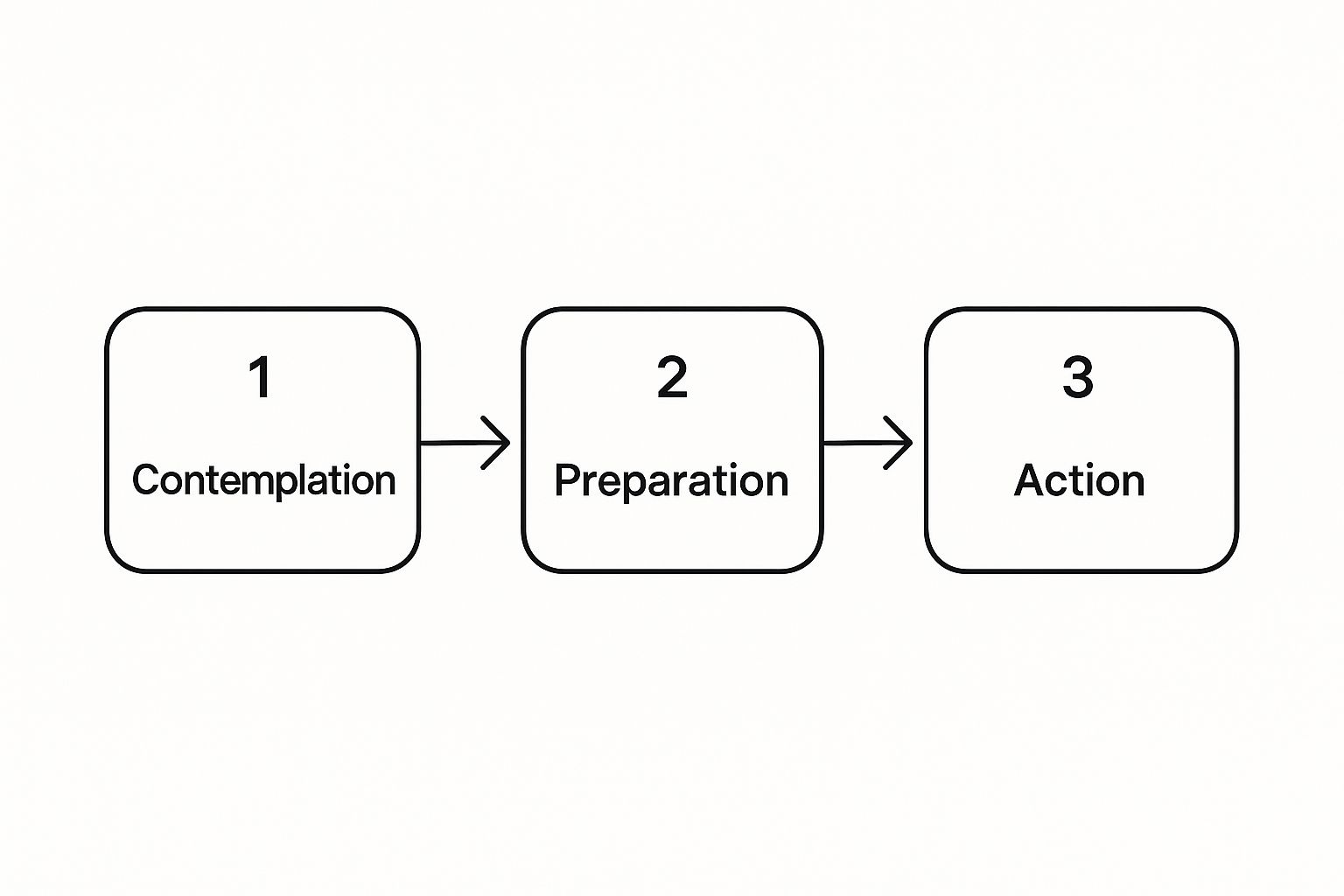
This visual maps the path from Contemplation and Preparation to Action, mirroring how MI helps sharpen your focus and prime you for the next steps.
Evoking: Uncovering Your "Why"
Many consider Evoking to be the very heart of motivational interviewing. Here, the therapist’s main job is to draw out your own internal arguments for making a change. We call this "change talk." Instead of the therapist listing all the reasons you should change, they skillfully help you discover and voice your own.
This is done by asking questions that get you to explore the pros and cons of changing versus staying the same, all from your unique point of view. The therapist listens intently for any statements you make that lean toward change and gently reinforces them. The entire theoretical basis of MI rests on this dual process of building a strong relationship while technically eliciting this change talk. As research shows, therapists skilled in both empathy and evoking change talk get far better results. You can read the full study about MI's theoretical framework and its effectiveness.
Planning: Committing to a Path
Finally, once you’ve clearly expressed a desire and ability to change, the conversation naturally shifts to Planning. This is where motivation gets turned into a concrete, actionable plan. The therapist might simply ask, "So, what do you think your next steps might be?"
This step is still a team effort. You take the lead in brainstorming realistic, manageable actions. This process is often a core component of more structured treatment settings. You can learn more about how this works by reading our guide on what an intensive outpatient program is. Because the plan is yours, you’re far more likely to see it through and hit your goals.
Real-World Applications of This Therapy

Motivational interviewing isn't just a niche technique for one specific problem; its real power comes from its incredible versatility. Because it's all about unlocking a person's own reasons for change, it can be applied to almost any situation where someone feels stuck between their current behavior and the life they actually want. It's become a cornerstone in many different fields for helping people navigate tough, but necessary, life changes.
One of its most well-known and impactful uses is in addiction treatment. Instead of trying to argue or confront someone’s resistance, a therapist using MI helps them explore the gap between their substance use and what they truly value—like being a dependable parent or excelling in their career. This approach is a game-changer for people who aren't quite ready to commit to recovery, gently helping them build their own motivation to take the next step.
Boosting Engagement in Mental Health
Beyond addiction, MI is a crucial tool in the broader world of mental health care. For someone wrestling with depression or anxiety, just the idea of starting therapy can feel completely overwhelming. Motivational interviewing is often the perfect first step, used to gently boost a person’s willingness to dive into other therapeutic models, like Cognitive Behavioral Therapy (CBT).
This collaborative spirit is also essential when dealing with complex cases where substance use and mental health issues overlap. Helping someone find their own motivation to heal is a critical first move on the path to a successful recovery through integrated dual diagnosis treatment.
By fostering a sense of partnership and autonomy, motivational interviewing empowers individuals to take an active role in their own mental wellness journey, making treatment feel less like a chore and more like a personal choice.
Improving Outcomes in Public Health
The principles of MI have moved far beyond the therapist’s office and into mainstream healthcare and public health. Think about the day-to-day grind of managing a chronic illness like diabetes or heart disease. Long-term success hangs on the small, consistent choices a person makes every single day.
Healthcare professionals use MI techniques to support patients in:
- Adhering to Medication Schedules: Helping people connect the simple act of taking their medicine with their personal desire to stay healthy and active for their family.
- Adopting Healthier Lifestyles: Guiding conversations about diet and exercise in a way that aligns with the patient’s own goals, not just the doctor’s orders.
- Managing Chronic Conditions: Empowering people to become active partners in their health, which dramatically improves long-term outcomes.
The proof is in the numbers. Over 200 controlled trials have shown that MI increases the odds of successful behavior change by 1.5 to 2 times compared to just giving standard advice. When it comes to substance use treatment specifically, interventions based on motivational interviewing result in 40-60% of patients showing major improvement. This remarkable adaptability makes it a powerful and humane tool for creating positive change across all kinds of human challenges.
Common Questions About Motivational Interviewing
As you get to know what motivational interviewing therapy is all about, a few practical questions are bound to pop up. Getting a real feel for how this approach works and what a session is like can help you decide if it’s the right fit. Let’s tackle some of the most common questions to give you clear, straightforward answers.
How Is MI Different from Other Talk Therapies?
One of the first things people ask is how motivational interviewing stands apart from other models, especially something like Cognitive Behavioral Therapy (CBT). While both are powerful, they have very different jobs.
Think of it like this: MI is the conversation that helps you figure out why you want to climb the mountain in the first place. It helps you find your own personal reasons for making the ascent. CBT, on the other hand, is the map and climbing gear—it gives you the practical tools and strategies to get to the top once you've decided to go.
MI is all about resolving that inner tug-of-war—the ambivalence—and building your own motivation to change. It's a partnership. In contrast, CBT is more structured, teaching you concrete skills to challenge the negative thought patterns and behaviors that keep you stuck.
The biggest difference is the therapist’s role. In MI, the therapist is your collaborative partner, guiding you to find your own answers. In CBT, the therapist is more of a teacher, showing you specific techniques to use.
This is a key distinction. MI is often a perfect starting point to build readiness for change, while CBT is fantastic for equipping you with the tools you'll need for the long haul.
What Does a Typical Session Feel Like?
A good motivational interviewing session should feel less like a clinical appointment and more like a genuine, supportive conversation. The entire vibe is intentionally non-judgmental and collaborative. You’re not going to be lectured, confronted, or told what you “should” do.
Instead, your therapist will likely:
- Ask open-ended questions that invite you to explore your own thoughts and feelings, rather than just giving "yes" or "no" answers.
- Listen more than they talk, using reflection to show they’re really hearing and understanding your point of view.
- Affirm your strengths and point out your past successes, no matter how small they might seem.
- Help you see the gap between where you are now and where you want to be, based on your own values and goals.
The whole experience is designed to be empowering. You are the expert on your own life. The focus stays on your hopes, your values, and your reasons for even considering a change. The goal is for you to walk out feeling heard, respected, and more confident in your ability to move forward.
Can MI Be Used Alone or with Other Treatments?
Motivational interviewing is incredibly flexible. It can absolutely be used as a standalone approach, especially in brief settings like a doctor's office to encourage a lifestyle change. But its true power often shines when it’s woven together with other treatments.
It’s frequently used as a "pre-treatment" to boost a person's commitment before they dive into a more intensive therapy like CBT or EMDR. For anyone struggling with co-occurring disorders, combining MI with other therapies is the gold standard. For instance, MI can build the motivation to address a substance use issue, which then helps a person engage more deeply and successfully in trauma therapy.
It also pairs seamlessly with other support services. When someone is considering options like Medication-Assisted Treatment (MAT) but feels uncertain, a therapist can use MI to help them explore their concerns. You can learn more about how these approaches work in tandem in our guide to what medication-assisted treatment is.
Who Is an Ideal Candidate for This Therapy?
While just about anyone can benefit from MI, it’s a game-changer for people who feel stuck in ambivalence or resistant to change. If you constantly find yourself in a “yes, but…” headspace—you know you want to change, but something is holding you back—MI was designed for you.
Ideal candidates often include:
- People who are on the fence about addressing their substance use or other addictive behaviors.
- Individuals struggling to follow medical advice for a chronic health issue.
- Clients who feel pressured by family or friends to change but haven't found their own personal motivation yet.
- Anyone who has tried to change before but couldn't keep the momentum going.
Ultimately, if you're looking for a respectful, empowering conversation that honors your freedom to choose and helps you connect with your own inner strength, motivational interviewing could be the perfect place to start.


